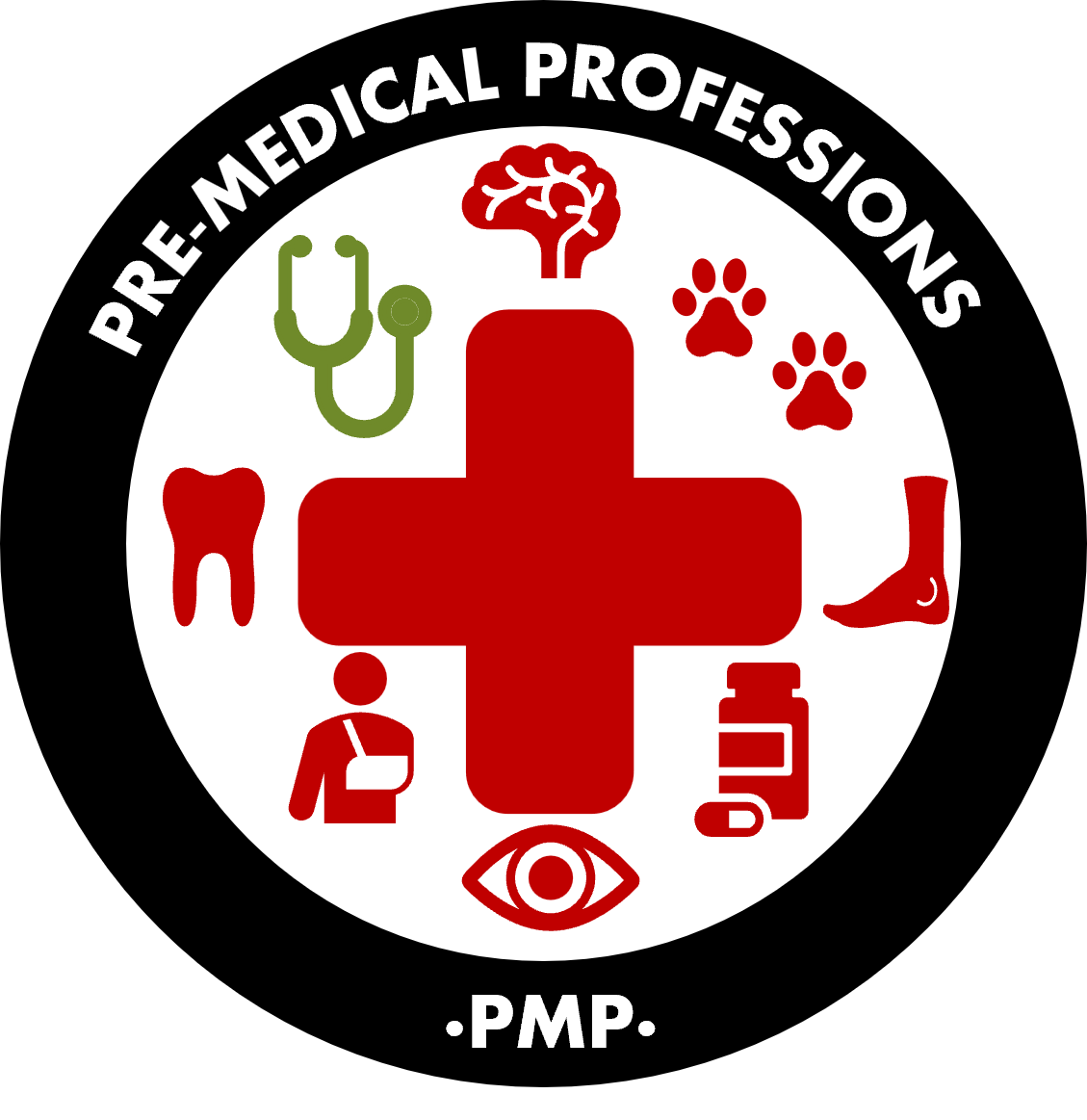Pre-Medical Professionals Concentration
Find Your Field as a Pre-Medical Professional
- Chiropractors assess, treat, and care for patients by manipulating the spine and musculoskeletal system.
- Most chiropractors work in a solo or group chiropractic practice. Some are self-employed.
- Chiropractors usually work full time, but part-time work is common.
- Chiropractors typically need a Doctor of Chiropractic (D.C.) degree. Completing a D.C. program typically takes about 4 years, in addition to at least 3 years of undergraduate study. Every state requires chiropractors to be licensed.
- The median annual wage for chiropractors was $76,530 in May 2023. Employment of chiropractors is projected to grow 10 percent from 2023 to 2033, much faster than the average for all occupations.
- More labor statistics for this sector...
- Dentists diagnose and treat problems with patients’ teeth, gums, and related parts of the mouth.
- Some dentists have their own business and work alone or with a small staff. Other dentists have partners in their practice. Still others work as associate dentists for established dental practices.
- Dentists must be licensed in the state in which they work. Licensure requirements vary by state, although candidates usually must graduate from an accredited dental program and pass written and clinical exams.
- The median annual wage for dentists was $170,910 in May 2023. Overall employment of dentists is projected to grow 5 percent from 2023 to 2033, about as fast as the average for all occupations.
- More labor statistics for this sector...
- Physicians and surgeons diagnose and treat injuries or illnesses and address health maintenance.
- Physicians and surgeons work in both clinical and nonclinical settings. Clinical settings include physicians' offices and hospitals; nonclinical settings include government agencies, nonprofit organizations, and insurance companies.
- Physicians and surgeons typically need a bachelor’s degree as well as a medical degree, which takes an additional 4 years to complete. Depending on their specialty, they also need 3 to 9 years in internship and residency programs. Subspecialization includes additional training in a fellowship of 1 to 3 years.
- Wages for physicians and surgeons are among the highest of all occupations, with a median wage equal to or greater than $239,200 per year. Overall employment of physicians and surgeons is projected to grow 4 percent from 2023 to 2033, about as fast as the average for all occupations.
- More labor statistics for this sector...
- Occupational therapists evaluate and treat people who have injuries, illnesses, or disabilities to help them with vocational, daily living, and other skills that promote independence.
- Occupational therapists work in a variety of settings, such as hospitals, schools, and outpatient clinics. They stand for long periods and may need to lift or move clients.
- To enter the occupation, occupational therapists typically need a master’s degree in occupational therapy. All states require occupational therapists to be licensed.
- The median annual wage for occupational therapists was $96,370 in May 2023. Employment of occupational therapists is projected to grow 11 percent from 2023 to 2033, much faster than the average for all occupations.
- More labor statistics for this sector...
- Optometrists diagnose, manage, and treat conditions and diseases of the human eye and visual system, including examining eyes and prescribing corrective lenses.
- Most optometrists work in offices or in optical goods stores. Optometrists usually work full time, but part-time work is common. Schedules may vary to include evenings and weekends.
- Optometrists typically need a Doctor of Optometry (O.D.) degree, which take 4 years of graduate-level study to complete. Every state requires optometrists to be licensed.
- The median annual wage for optometrists was $131,860 in May 2023. Employment of optometrists is projected to grow 9 percent from 2023 to 2033, much faster than the average for all occupations.
- More labor statistics for this sector...
- Pharmacists dispense prescription medications and provide information to patients about the drugs and their use.
- Pharmacists work in pharmacies, including those in drug, general merchandise, and grocery stores. They also work in hospitals and other healthcare facilities that are open 24 hours. Most pharmacists work full time, and some work nights, weekends, and holidays.
- Pharmacists typically need a Doctor of Pharmacy (Pharm.D.) degree. Every state requires pharmacists to be licensed.
- The median annual wage for pharmacists was $136,030 in May 2023. Employment of pharmacists is projected to grow 5 percent from 2023 to 2033, about as fast as the average for all occupations.
- More labor statistics for this sector...
- Physical therapists help injured or ill people improve movement and manage pain.
- Physical therapists typically work in private offices and clinics, hospitals, patients’ homes, and nursing homes.
- They spend much of their time on their feet, actively working with patients.
- Physical therapists entering the occupation need a Doctor of Physical Therapy (DPT) degree. All states require physical therapists to be licensed.
- The median annual wage for physical therapists was $99,710 in May 2023. Employment of physical therapists is projected to grow 14 percent from 2023 to 2033, much faster than the average for all occupations.
- More labor statistics for this sector...
- Physician assistants examine, diagnose, and treat patients under the supervision of a physician.
- Physician assistants work in physicians’ offices, hospitals, outpatient clinics, and other healthcare settings.
- Most work full time. To enter the occupation, physician assistants typically need a master’s degree from an accredited program. All states require physician assistants to be licensed.
- The median annual wage for physician assistants was $130,020 in May 2023. Employment of physician assistants is projected to grow 28 percent from 2023 to 2033, much faster than the average for all occupations.
- More labor statistics for this sector...
- Podiatrists provide medical and surgical care for people with foot, ankle, and lower leg problems.
- Podiatrists usually work in offices of podiatry, other medical offices, or hospitals. Most work full time, and some need to be on call for emergencies.
- Podiatrists must earn a Doctor of Podiatric Medicine (DPM) degree and complete a 3-year residency program. Every state requires podiatrists to be licensed.
- The median annual wage for podiatrists was $141,650 in May 2023.
- Employment of podiatrists is projected to grow 1 percent from 2023 to 2033, slower than the average for all occupations.
- Despite limited employment growth, about 300 openings for podiatrists are projected each year, on average, over the decade. Most of those openings are expected to result from the need to replace workers who transfer to different occupations or exit the labor force, such as to retire.
- More labor statistics for this sector...
- Veterinarians treat the injuries and illnesses of pets and other animals with a variety of medical equipment, including surgical tools and x-ray and ultrasound machines. They provide treatment for animals that is similar to the services a physician provides to humans.
- Most veterinarians work in private clinics and hospitals. Others travel to farms or work in settings such as laboratories, classrooms, or zoos.
- Veterinarians must have a Doctor of Veterinary Medicine degree from an accredited veterinary college, as well as a state license.
- The median annual wage for veterinarians was $119,100 in May 2023. Employment of veterinarians is projected to grow 19 percent from 2023 to 2033, much faster than the average for all occupations.
- More labor statistics for this sector...

Chiropractor
Dentist
Physician/Surgeon
Occupational Therapist
Optometrists
Ophthalmologists
Pharmacist
Physical Therapist
Physician's Assistant
Podiatrist
Veterinarian


Hospitals
Hospital Systems
Own your Own Business
Local Non-Profits
State Agencies
Global NGOs
Large Corporations
Local Businesses
Area Clinics
Public Health Entities
Global Health Networks
Bureau of Labor Statistics, U.S. Department of Labor, Occupational Outlook Handbook. Healthcare.
Know Your Path as a Pre-Medical Professional
Biology & Science Core
Cells, Metabolism, & Genetics + Lab • Ecology, Evolution & Diversity + Lab • Algebra • Biophysics + Lab • Chemistry + Lab • Professional Aspects of Biology
PMP Requirements
Animal Biology & Diversity + Lab or Microbial Biology & Diversity + Lab • Evolution • Molecular & Cell Biology + Lab or Genetics + Lab • Biochemistry • Animal Physiology + Lab or Cell Biology + Lab • Comparative Anatomy or Immunology or Introductory Biostatistics or Science Process Clinical Research
PMP Biology Electives
PMP Example Courses for Selection: General Education Requirements
Personal & Public Health • Introductory Sociology • Psychology • Human Values in Health Science • Healthcare Issues • Principles of Economics - Micro • Fundamentals of Public Speaking • International Healthcare • Entrepreneurship • Healthcare Org/Management • Health Disparities & Equity
PMP Courses for Entrance into Professional School
Each pre-professional track has additional required courses for entrance to professional school. Typically, these include some mix of the following. Many may be included as part of your minor or general education requirements.
Usually Included: Chemistry II • Organic Chemistry I • Organic Chemistry II • Biophysics II • Calculus
Occasionally Included: Medical Terminology • Human Anatomy & Physiology • Histology • Public Speaking • Principles of Economics • English Composition • Exercise Physiology • Ethics • Psychology • Developmental Psychology • Abnormal Psychology • Sociology
PMP Course Tools
Review the specific requirements for your career-track below.
| Pre-Chiropractic | Pre-Optometry | Pre-Physician Assistant |
| Pre-Dentistry | Pre-Pharmacy | Pre-Podiatry |
| Pre-Medicine | Pre-Physical Therapy | Pre-Veterinary |
| Pre-Occupational Therapy |
Find Your Place as a Pre-Medical Professional
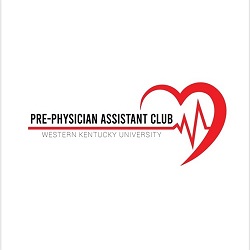
The Biology Department has many student organizations to chose from and clubs are great way to make friends and get involved! In the PMP concentration, we have chapters of AED and AMSA and a Pre-Veterinary Club, Pre-Optometry Club, Pre-Physician Assistants Club, and a Pre-Physical Therapy club.

There are many opportunities to participate in research as an undergraduate student in our department, from public health and patient outcomes to of disease progression and transmission. Our undergrads regularly present at conferences and contribute to new discoveries! Find an lab that matches your professional interests!

Ogden College offers all our pre-professional students specialized advising to transition from WKU-BIOL into the professional school of your choice. Services include information on schools/requirements, help with applications and admission, resources for entrance exams, and links to schools and associations.

The mission of the KAS is to catalyze scientific communication and collaboration that will improve research, education, and evidence-based public engagement within the Commonwealth of Kentucky. Select: Membership >> Become a Member >> Join Online Now. On the form, select WKU as your institution and use your WKU e-mail.
In partnership with Med Center Health, students can complete a Patient Coordinator Internship. Patient Coordinators work to ensure quality care and by linking electronic medical records, patient data, and physician planning, with the goal of higher quality care and better patient outcomes.
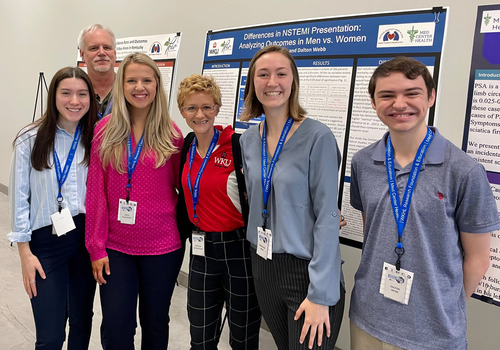
In the Science Process Course in Clinical Research, students develop and conduct a clinical research project in partnership with a Med Center Health. Upon completion, students present their research to a panel of Medical Center representatives for evaluation of relevance, practicality, and interest.
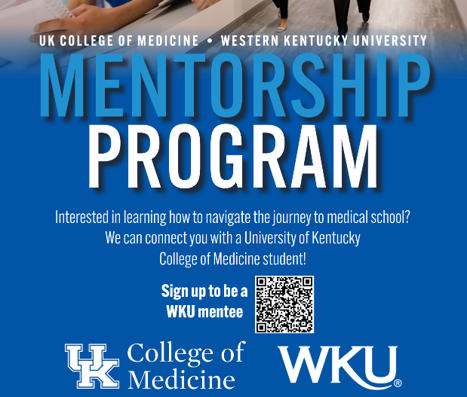

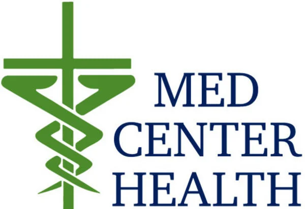
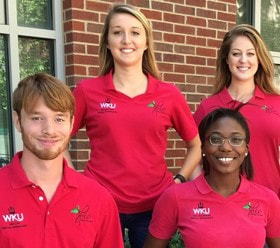
Biology Ambassadors are an elite group of students who assist with recruitment, retention, and advising. They help prospective students and visitors understand that the Biology Department is truly an exceptional place.

BioCoaches are talented upper division students that serve as peer mentors and learning assistants in our introductory courses. Serving in BIOL 120 is best for PMP students, and you'll receive course credit for playing a vital role in student success.
Some of the links on this page may require additional software to view.


